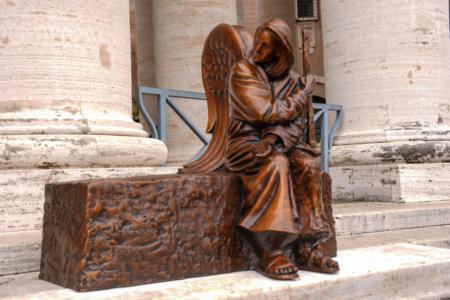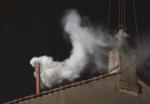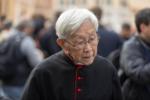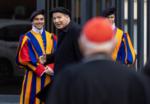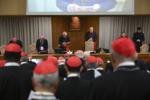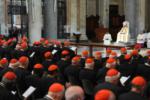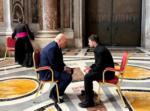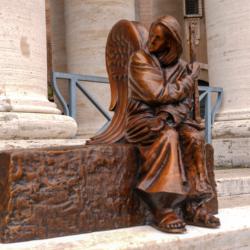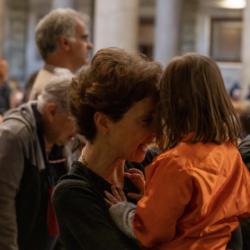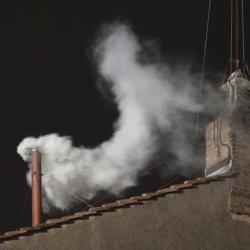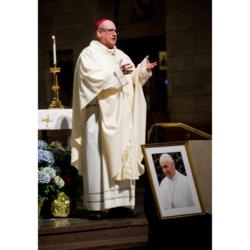Feast of Ugandan Martyrs celebrated in Waltham
WALTHAM — Men, women and children dressed in colorful African attire and nearly 200 others turned out to honor the faith and courage of St. Charles Lwanga and the Ugandan martyrs with a Mass at Sacred Heart Church June 6 that included hymns in their African tongue and traditional dance.
The celebratory Mass for the Ugandan martyrs, which organizers hope to hold again next year, focused on how the martyrs obeyed the will of God and died for their faith rather than turning their backs on God to save their lives.
St. Charles Lwanga was among those Ugandan martyrs burned to death in 1886 for refusing to renounce the Catholic faith. Others were mutilated, beheaded and tortured. Pope Paul VI canonized 22 of the martyrs in 1964. Their feast day is celebrated June 3.
The witness of the Ugandan martyrs helped transform Uganda from a country of very few Catholics, approximately 200 at the time of their deaths, to one which today claims almost three million Church members.
The Office for Black Catholics in the Archdiocese of Boston, the Ugandan Martyrs Choir and Sacred Heart Parish hosted Bishop Albert Edward Baharagate, bishop emeritus of the Kampala diocese in Uganda, whom they invited to Boston to celebrate the Mass.
Evident at Mass were many African influences, including the colorful lines that adorned the altar and the lectern from which the readings were proclaimed. The Ugandan Martyrs Choir wore bright red dresses, and the Black Catholic Choir wore traditional African clothing. They set the celebratory tone of the Mass, which lasted nearly three hours, with their lively songs, clapping and with instruments such as tambourines and maracas.
Young Ugandan children dressed in colorful skirts and wraps and T-shirts that honored the martyrs danced down the center aisle of the church as the Book of the Gospels was brought to the altar for the Gospel reading. In preparation for the Mass, the children said they had practiced their dancing for almost two weeks. The traditional dance, which consisted of hand motions, step-work and spinning, is done on special occasions, they said.
“It was a really good experience to do something to make the Mass more interesting, more alive and also to show people how we celebrate,” said Ann Mutebi, 15, who is Ugandan and performed the dance with her sisters Vivian and Bridget. “It was really exciting.”
After the Gospel, Bishop Baharagate said, “God has given us a wonderful day. Let us rejoice and be happy,” reminding the congregation that the martyrs did not fear death, but looked expectantly to it because they believed they would be reunited with God.
“It is important to remember the lesson [of the martyrs] — to put God first in all our actions and choices,” said Bishop Baharagate, who retired as a bishop 13 years ago. The martyrs accepted death because they “were convinced that their reward was going to be great,” he said.
The bishop, whose seminary studies were financed by a benefactor from Boston, went on to describe their deaths as a “great victory.”
“The martyrs rejuvenated Africa,” he continued. “Their heroism has become our pride ... and has led to the flourishing of Christianity in Africa.”
Referring to the day’s Gospel, which said the seed that dies bears much fruit, the bishop said that, “The blood of the martyrs has indeed come to seed,” because the population of Uganda is now 80 percent Christian and 45 percent of those are Catholic. He also said that Christianity is the second largest religion in Africa.
“We must thank God for all the benefits which have come from the Ugandan martyrs,” Bishop Baharagate said at the close of his homily. “May these African ancestors of ours obtain for us the love that has spread the Christian faith.”
The Mass then proceeded to the celebration of the Eucharist. In addition to bringing up the hosts that would be consecrated, some members of the Black Catholic community in attendance brought baskets of fresh fruits and vegetables which symbolized God’s generosity and love.
Those in attendance originally from Uganda rejoiced at having a bishop from their country celebrate the Mass honoring such an important feast for their people.
“It feels like we are home when he is here,” said Allan Peter Sseguya, who came to the United States from Uganda four years ago. Sseguya appreciated the bishop’s homily and the example of the martyrs, which the bishop highlighted.
“The martyrs teach the lesson that through Christianity we can be courageous” defenders of our faith, he said. “They show me that I should be strong in Christ too.”
